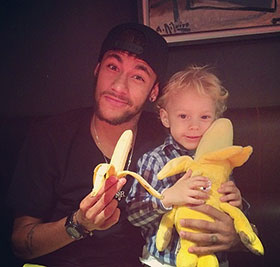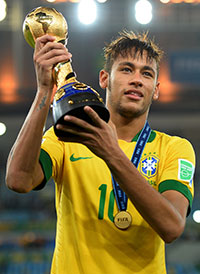Brazil pin-up – Neymar

Roula Khalaf, Editor of the FT, selects her favourite stories in this weekly newsletter.
Late this season Barcelona’s Brazilian footballer Dani Alves was preparing to take a corner during a Spanish league match when a spectator threw a banana on to the pitch, a familiar form of racist abuse. Alves picked it up, unpeeled it and ate it. Hours later Neymar, his teammate and a fellow Brazilian, posted a picture on social media of himself eating a banana, next to his toddler son holding a cuddly toy banana. He added the hashtag #weareallmonkeys in English, Spanish, Portuguese and Catalan.
The picture went viral. It prompted more than a million “likes” on Facebook and half a million on Instagram. On Twitter, it generated more than three million interactions, including an approving tweet by the Brazilian president, Dilma Rousseff. Dozens of sports stars, other celebrities and public figures such as the Italian prime minister Matteo Renzi posed for pictures holding bananas. What had been an individual, spontaneous act by Alves had, thanks to Neymar, turned into the most instantly successful anti-racism campaign the sport has ever seen.
WORLD CUP SPECIAL

Italy
Exclusive interview with top player Andrea Pirlo
Spain
How the reigning champions plan to do it again
Argentina
Can Messi ‘the Messiah’ live up to his name?
England
Why are they so bad
at penalties?
Cameroon
The team with ‘hemle’ and Samuel Eto’o on their side
Bosnia & Herzegovina
Their manager talks strategy for their debut World Cup
United States
How the US learnt to
love soccer
Colombia
Can the team affect presidential elections?
My friend Pelé
An ‘imperialist Yankee’ reminisces
How to save a penalty
Dutch goalkeeper
Michel Vorm explains
Neymar, aged 22, is the outstanding talent of the current generation of Brazilian footballers, and not just for his performances on the pitch. His charisma and media savvy have given him a unique stardom. In Brazil his face is ubiquitous on billboards, on supermarket shelves and in TV ad breaks. He is a fashion icon, a musical trendsetter and, as illustrated by #weareallmonkeys, a political voice. There have been famous Brazilian footballers before, of course, but none of his stature in the age of social media, and none who has thrived so much on the interaction with fans.
Neymar – full name Neymar da Silva Santos Júnior – is also the reason why Brazilians remain excited about the World Cup, in spite of the public relations disaster it has been so far. If Brazil wins at home, the delayed stadiums, the unbuilt infrastructure and the nationwide protests will be forgotten. “Neymar is the only player who can give Brazil the edge – that’s what everyone thinks and it is true,” says Raí Souza Vieira de Oliveira (known simply as Raí), who played for Brazil in the 1994 World Cup. “If Neymar is playing really well, Brazil is favourite to win. If Neymar is playing OK, Brazil are at the same level as the other teams. And if Neymar is playing badly, Brazil is worse than the others.”
The importance of Neymar to Brazil, however, is not just that he raises their game. It’s that he plays in a classically Brazilian way, combining supreme ball skills with playful and mischievous dribbles and feints. Watching Neymar makes Brazilians proud of being Brazilian, reminding them of their glorious footballing heritage. He gives them hope that not only can they win the World Cup, but also – as importantly – that they can win it with style.
Neymar has been the Great Hope of Brazilian football ever since he joined the youth academy of his local club, Santos, when he was 11. Reporter João Henrique Marques went to see him play aged 13 for his school indoor football team. “The kids were all the same age, but he looked like an 18-year-old playing with a bunch of 11-year-olds. He could kick strongly with both legs, dummy, dribble – most people who are aged 20 can’t do what he did. I was blown away.”
As inevitably as rain falls in the Amazon, the emergence of a precocious Brazilian talent comes with the tagline “the next Pelé”. With Neymar, the cliché was more apt than most. Santos was Pelé’s club, and its role was crucial in the young player’s development. A port city with a beach, Santos is sleepy and provincial compared to São Paulo, population 20 million, an hour’s drive inland. Not only does Santos have less money than the big São Paulo clubs, meaning that it relies more on its academy, but its players come under less public scrutiny, because it has fewer and less demanding fans. Neymar was given the space to develop his talent, as well as – relatively speaking – lead the life of a typical Brazilian teenager, hanging out on the beach with his friends.
…
He does share one telling similarity with Pelé: both are sons of journeymen footballers whose careers were curtailed by injuries. The fathers became their role models and teachers. When Neymar was 13, his father, who is also called Neymar, devoted himself full time to managing his son’s career.
Neymar made his debut for Santos at 17, in 2009. “Neymar is the first great player who arrived on the scene as a success foretold, already causing a frisson in Santos fans well before he kicked a ball,” wrote the author José Miguel Wisnik. The new Pelé did not disappoint. Neymar was a skinny tyke but had a cocky swagger to his game, taunting opponents with his skills, racing past defenders and scoring dazzling goals. Early in 2010 Santos won the São Paulo state championship and Neymar won the award for best player.

From the beginning Neymar relished his role in the public eye, getting an exaggerated Mohican hairstyle and then dyeing it blond, and launching dance crazes by performing choreographed moves as goal celebrations. Just as Justin Bieber has the Beliebers, he had his own fans, the Neymarzetes, who would show up at games with banners such as “Neymar, Impregnate Me” and post on his Facebook page tattoos they had made of his name. On one occasion there were so many girls waiting for him at Salvador airport that his bodyguards locked him in the toilet for an hour for his own protection.
With his reputation growing as the best young player in Brazil, his behaviour began to change, a result, it is said, of the influence of older players at Santos like Robinho, formerly of Manchester City. Neymar would stay out all night partying. When during a league match he repeatedly swore at his coach, Dorival Júnior, for not letting him take a penalty, the opposing coach, René Simões, told the TV cameras, as if acting in loco parentis on behalf of the nation: “We need to educate him, or we are going to create a monster.”
It was a turning point. Santos appointed a small team whose job was to look after Neymar’s public image. He calmed down. Yet what really endeared Neymar to supporters was that when the inevitable offers came from the big European clubs, he turned them down to carry on playing at Santos. It was the first time since the 1980s that a Brazilian player of his potential had decided to stay in Brazil. Even though this was a reflection of the booming Brazilian economy – he was able to make as much money at Santos as he would have done in Europe – it turned him into a national hero.
The lion’s share of Neymar’s earnings come from personal sponsors, rather than the club, leading to an almost comic saturation in Brazil of his face in advertising. He promotes a perfume, a bank, a phone company, a fizzy drink and a carmaker, as well as pharmaceuticals, sportswear, deodorant and car batteries. When he’s not playing well, his nickname is “Neymarketing”.
By 2013, the public mood had changed. No longer was staying at Santos an act of patriotism. It was an act of treason! How on earth would Brazil win the World Cup if its best player had no experience against the best players in Europe? Neymar owed it to the nation to go to Europe. Shortly before last year’s Confederations Cup, Neymar announced that he was transferring to Barcelona.
The Confederations Cup was a watershed, both in social and sporting terms. The event became a focus for widespread protests about corruption and bad governance, but it also made Brazilians believe in the national team again after the disappointments of losing the 2012 Olympic final, and exiting the last two World Cups in the quarter-finals. Three minutes into the opening game, against Japan, Neymar scored with a wonderful strike from outside the box. Brazil won the tournament, unbeaten, with Neymar awarded the Golden Ball for best player.
…
Neymar’s first season at Barcelona has been disappointing, at least compared to the hype that welcomed him. (An unexpected distraction was the resignation of Barcelona’s president Sandro Rosell after allegations of fraud in Neymar’s transfer deal.) From being the biggest star in a country, Neymar is, next to Lionel Messi, not even the biggest star in his team. To Raí, however, his relative anonymity in Spain is a blessing for Brazil since it relieves the player of some pressure for the World Cup. “Neymar has all the responsibility for Brazil, which is not small, but he doesn’t have the pressure of being obliged to be the best in the world. Neymar’s responsibility is to make the difference for Brazil, and maybe be best in the world.”

Neymar’s Brazilianness is apparent not just by the way he plays or by how he looks but also by his use of social media. Brazilians are huge users of social networks, perhaps because they have a very friendly, informal, inclusive culture. If you follow the Brazilian national team on Instagram, the photo-sharing site, you will see them messing about, taking selfies, often pulling silly faces, or posting religious messages. Neymar, who has 5.1 million Instagram followers, comes across as an irreverent teenager, a Brazilian everyman, the fun-loving guy who grew up on the beach at Santos, especially compared to footballers such as Cristiano Ronaldo, whose feed consists predominantly of professional publicity shots.
But while Neymar’s Instagram snaps are charmingly amateurish, around him he has probably the most professional marketing team of any active sportsman. On his website you can buy hundreds of Neymar-branded items including cushions, jigsaws, dolls, coasters, school notepads and small discs used for playing “button football”, a traditional Brazilian variant of table football.
The #weareallmonkeys campaign, even though it looked spur-of-the-moment, had been planned for weeks. Neymar had himself been the victim of monkey taunts earlier in the season and his father and media adviser Eduardo Musa decided that the player must respond in some way. They got in touch with the São Paulo ad agency Loducca, who came up with the hashtag and the idea of Neymar eating a banana. “We were waiting for the moment to launch,” says Guga Ketzer, chief creative officer of Loducca. “When Dani ate the banana, we said this is the best time – let’s put this campaign on air.”
The #weareallmonkeys campaign showed that Neymar has commitment, timing and leadership. His country will be hoping he shows the same qualities on the pitch during the World Cup.
Alex Bellos is the author of ‘Futebol: The Brazilian Way of Life’ and other books.
To comment on this article please post below, or email magazineletters@ft.com
Comments